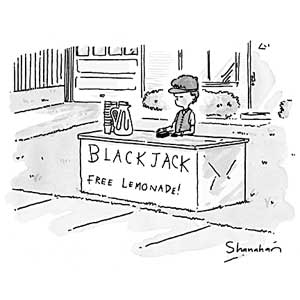Reluctantly, I will admit to having played blackjack professionally in my youth. This means that I played tens of thousands of hands against real dealers in real casinos using real money.
Unlike the stock market, blackjack is a completely closed system, which has a very large number of, but not infinite, possible outcomes (about 4.1 billion, if memory serves).
 |
The mathematics of blackjack are extremely well understood and there have been a number of very good books written describing various systems which have been both empirically, as well as mathematically proven to provide an overall edge over the house of between .5% and 1.5%.
There is a "basic strategy" to blackjack that has been worked out by players and mathematicians for some time now. It varies to a small degree depending on what house rules you're playing under, such as if you can double down on 18, 17, what you can split on, etc. Mastering that strategy, and learning to count cards, and playing in a shoe with fewer than 3 decks, and where they don't shuffle halfway through, you can tilt the odds in your favor.
In order to beat the house, you must play like a machine. You cannot make mistakes and there is no "trading" involved. You simply keep track of the number of tens/aces vs. the number of non tens/aces and the more tens/aces that are in the deck as compared to the number that would ordinarily be present in a standard deck, increases your edge against the house, and visa versa.
When the count is "high", you bet more, when it is "low" you bet less. Over time, as long as you don't make many mistakes in counting, you will win -- the outcome is completely predicable in advance and it is inevitable.
However, get tired, make a simple mistake or three, easy to do, and you wipe out hour's worth of work. You rarely see a casino offer the game anymore under like 4-6 decks in the shoe, and they typically reshuffle it when they're only 2/3 of the way through, which really sucks butt. A couple casinos, that I've seen in Vegas anyway, have tables with only one deck in the shoe (it's really a "door crasher" special, they want you to move to higher limit tables), but the limits are sharply reduced, and as soon as they figure you for a player, you're out.
The difficulty is that casino security will watch you play, and if you are winning, by placing higher and lower bets depending upon deck composition, you will be annoyed, harassed and eventually barred from playing.
Years ago, it was relatively easy to get a reasonable game. Today, it is possible, however, much more difficult. The casinos have dumbed down most customers and made the rules much less favorable. In the few places where the odds are still favorable, the casino watches for counters very carefully, making counting for any serious money even more difficult.
The only things in my opinion that are similar between trading and blackjack are:
A different argument points to the near certainty of some stocks, funds, or analysts [read traders] doing well over an extended period merely by chance. Of 1000 stocks (or funds or analysts), for example, roughly 500 might be expected to outperform the market next year simply by chance, say by the flipping of a coin. Of these 500, roughly 250 might be expected to do well for a second year. And of the 250, roughly 125 might be expected to continue the pattern, doing well three years in a row simply by chance. Iterating in this way, we might reasonably expect there to be a stock (or fund or analyst) among the thousand that does well for ten consecutive years by chance alone. Once again, some in the business media are likely to go gaga over the performance.
|
John Allen Paulos A Mathematician Plays The Stock Market. |
I've played blackjack for over 10 years. In fact, I worked out one of my favorite "negative expectancy" money management schemes playing it, which is a variation of the old "31" method, which is of course a variation of the "mother of them all", the Martingale. I hope to successfully tweak the method to suit my trading in a positive expectancy environment--I can see it reducing my risk exposure a great deal, albeit at the cost of some growth rate.
There is no way to intimidate the house in blackjack, and no way to influence the cards by playing style. All of the working systems are based on absolutely mechanical play depending upon the cards in view and the composition of the deck, at any given instant. For every circumstance in blackjack, there is but one correct play, depending upon the count.
This is not the same as trading, although it may seem like it.
In summary, if you think that you can somehow "trade" with the house in blackjack and win, you will get slaughtered. And, if you doubt this theory, then I will be happy to bet you $100,000.00 that I can methodically play system blackjack against you, under controlled conditions, starting with the same bankroll, and at the end of 100,000 hands, I will have more money than you will.
There are two games you can win at..... Card counting and poker. Well that is mathematically speaking though because you are playing games that are almost 50/50 so really anything can happen in the short term. Good luck!
The content of this site is copyright 2016 Financial Spread Betting Ltd. Please contact us if you wish to reproduce any of it.